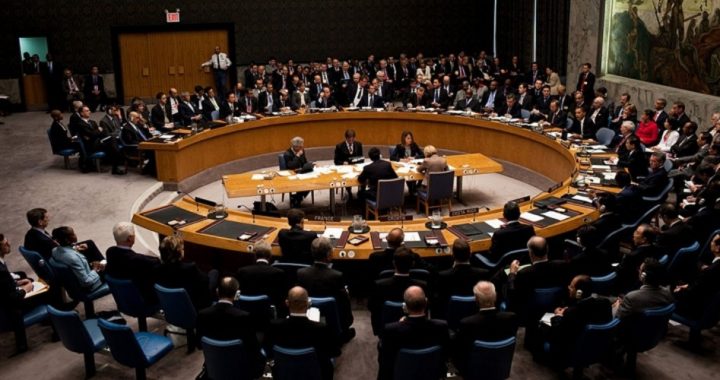
As the United Nations and its “law enforcement” and heavily armed military tentacles become increasingly powerful, a growing coalition of rulers from around the world are openly seeking to strip the U.S. government and the other four permanent UN Security Council members of their veto power. Without properly explaining the consequences, the establishment press has relentlessly hyped the scheme as well. If such “reforms” were to be adopted, though, the implications for the world would be massive, allowing the UN and its member regimes to make purportedly “binding,” veto-proof decisions for humanity — including on the deployment of UN troops.
Ironically, despite the largely autocratic composition of the global body — widely ridiculed as a “dictators club” for its totalitarian-minded membership roster — proponents of eliminating the veto argued that the move would make the UN more “democratic.” Of course, in the UN General Assembly, the votes of tyrants such as Robert Mugabe of Zimbabwe, Raul Castro of Cuba, Kim Jong-un of North Korea, or any other tinhorn dictator carry the same weight as those of elected governments such as those in the West. Even genocidal mass-murderers “indicted” by the UN’s kangaroo court get a vote. Apparently, in UN-speak, that is “democracy.”
Speaking at the 69th session of the UN General Assembly in New York, national leaders and dictators of various persuasions all demanded urgent “reform” of the global outfit. Among the sought-after reforms, special emphasis was put on further empowering the UN and pushing the long-running plot to let UN member regimes dictate policies for the whole globe or even launch planetary wars without risking a veto from major powers. Dozens of high-level government representatives, including some who wield vetoes, were also pushing to limit veto powers, suggesting it should not be used in cases of “mass atrocities.”
Right now, the five permanent members of the UN Security Council — the governments of the United States, Communist China, Russia, the United Kingdom, and France — are able to block major UN schemes using the veto. Using that power, any of those governments can block, for instance, the deployment of UN troops or “binding” Article VII measures. Critics, though, want that to end. “The world is bigger than five,” complained Turkish President Recep Tayyip Erdogan, an Islamist whose government is listed as among the worst persecutors of journalists, during his UN speech last week.
Other rulers of UN member states pushed the same narrative. Peruvian President Ollanta Humala Tasso, among others, claimed the “status quo” made the UN inefficient. “The Security Council’s capacity to respond to the different crises in different parts of the world reflects the need for reforming its work methodology,” he said, calling for more permanent and rotating members on the Security Council to produce a more “democratic” system of what internationalists refer to as “global governance.”
The brutal dictatorship ruling over Eritrea was even more adamant, blasting the “dominant powers” for supposedly blocking “vital” UN reforms. “The United Nations, the organization that ostensibly represents the entire community of nations and the peoples of the world, remains stuck in the past,” complained Eritrean “Foreign Minister” Osman Saleh, whose unelected regime is infamous for torturing dissidents. “It remains thoroughly dominated by the few and has marginalized the overwhelming majority. Its institutions and structures are an anachronism in the modern world.”
Ironically, despite Saleh’s purported concern for the “majority,” the Eritrean regime’s all-powerful “president” has been in power since 1993, and all other parties are banned. “Torture, arbitrary detention, and severe restrictions on freedom of expression, association, and religious freedom remain routine in Eritrea,” Human Rights Watch said about the regime, which was sanctioned in 2011 for a wide array of abuses. Presumably the concern for the “majority” extends to UN member governments — not people.
Saleh claimed the UN needed to pursue with much more vigor the “fundamental objectives for which it was established,” which he described as “global peace and security,” ending poverty, ensuring “sustainable development,” advancing deeply flawed notions of “human rights,” avoiding epidemics, “protecting the environment,” and ensuring “equality.” In other words, unlimited powers over virtually everything. As such, he blasted the “cynical opposition of the dominant powers” for allegedly blocking efforts to “democratize” the UN.
From Asia, Japanese Prime Minister Shinzo Abe also pushed reforms for the UN Security Council, seeking to have his government join as a permanent member. “It is my wish … [that] countries sharing the same aims all work together to finally resolve a long-standing issue to reform the UN in a way that reflects the realities of the 21st century,” he said, adding that the Japanese government has worked to advance UN causes since it joined the global outfit in 1956.
Even some European leaders joined in. Before heading to New York for UN meetings, Polish President Bronislaw Komorowski lashed out at the veto as well, outraged by Russian strongman Vladimir Putin’s ability to derail UN “action” on Ukraine. “My main message will be that perhaps the United Nations should be reformed to make the institution capable of addressing the threats that really exist today,” he said in Warsaw. “I think blocking the Security Council on Ukraine is a token, a symptom, of the general weakness of the UN.” He made similar arguments at the UN gatherings last week.
More significant still, perhaps, are moves by the French and British governments — both veto-wielding permanent members of the Security Council — to chip away at their own powers within the global outfit. French Foreign Minister Laurent Fabius, for instance, representing the bankrupt socialist government of France, called for the five permanent members to “voluntarily” refrain from blocking measures dealing with what he called “mass crimes.” Demanding an agreement on the veto limitations by next year, he added: “We cannot stay paralyzed.” It was not clear who would define “mass crimes” or how.
Obama’s radical ambassador to the UN, Samantha Powers, who openly claims the U.S. should give up yet another “pinch” of national sovereignty to globalist outfits, did not specifically say whether or not she supported the escalating anti-veto machinations. Analysts observed that, for now at least, with the U.S. government regularly using its veto to block anti-Israel resolutions, full-blown support from Washington, D.C., for abolishing or limiting its own veto is unlikely.
British ambassador Mark Lyall Grant, though, praised the French government’s proposal to limit the veto power. “The U.K. is appalled by its recent abuse at the expense of millions of suffering civilians,” he said, referring to the Russian and Communist Chinese governments’ use of the veto to block UN “intervention” against Syrian despot Bashar al-Assad. Obama’s ambassador Powers has also slammed the vetoes regarding Syria. Moscow and Beijing, citing other bloody “interventions” approved by the UN, portrayed their decisions as a way to save the UN and its members from themselves.
Still, the uproar over the decisions on Syria has been serving as a key pretext for attacking the veto for years. In early 2012, for instance, as The New American reported at the time, then-UN General Assembly President Nassir Abdulaziz al-Nasser of Qatar slammed Russia and China for vetoing a measure to depose Assad, arguing that it was time to change the system. He claimed veto powers were a threat to “world peace” and were standing in the way of the UN becoming essentially a true, global, autocratic government in charge of everything from health, food, and human rights to security, “climate,” and crisis management. “We need a very effective UN and very effective UN Security Council,” al-Nasser argued.
Of course, with the executive branch of the U.S. government largely dominated for generations by UN-loving globalists from the Council on Foreign Relations and similar outfits, the U.S. veto is more symbolic than a genuine obstacle to “global governance” scheming. Instead of debating whether or not to scrap the veto, Congress ought to be discussing an end to the showering of U.S. taxpayer funding on a dictator-dominated outfit with a charter and member regimes that are fundamentally at odds with the U.S. Constitution, national sovereignty, individual liberty, national security, and more.
If Americans demand that their elected representatives defund the UN and pass H.R. 75, the American Sovereignty Restoration Act, preserving the veto would become a moot point. Then the dictators of the world can “democratize” the UN all they like — and Americans can keep their wealth, independence, and freedom.
Photo: meeting of the UN Security Council
Alex Newman, a foreign correspondent for The New American, is normally based in Europe. He can be reached at [email protected]. Follow him on Twitter @ALEXNEWMAN_JOU.
Related articles:
Citing Syria, UN Assembly Boss Says End Security Council Veto Power
UN “Peace” Armies to Drastically Expand with Obama’s Support
The United Nations: On the Brink of Becoming a World Government
UN “Peacekeeping” Troops Face Scandals on Sex Crimes, Corruption
With Obama Support, Interpol to Lead Global “Terror War” Scheme
UN “Peacekeeping” Military Using Drones, With Obama’s Support
China, G77 Tyrants, and UN Boss Demand “New World Order”
Ruthless Tyrants Win Seats on UN “Human Rights” Council
UN Troops Accused of Sex Crimes Worldwide




